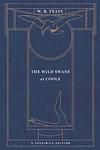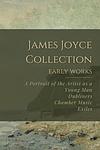The Greatest Irish, German Books From 1910 to 1919
Click to learn how this list is calculated.
This list represents a comprehensive and trusted collection of the greatest books. Developed through a specialized algorithm, it brings together 288 'best of' book lists to form a definitive guide to the world's most acclaimed books. For those interested in how these books are chosen, additional details can be found on the rankings page.
Genres
Countries
Date Range
Reading Statistics
Click the button below to see how many of these books you've read!
Download
If you're interested in downloading this list as a CSV file for use in a spreadsheet application, you can easily do so by clicking the button below. Please note that to ensure a manageable file size and faster download, the CSV will include details for only the first 500 books.
Download-
1. A Portrait of the Artist as a Young Man by James Joyce
This novel is a semi-autobiographical account of a young man's intellectual and artistic development in late 19th-century Ireland. The protagonist struggles with issues of identity, faith, and nationality, ultimately rejecting the traditional values of his Catholic upbringing to pursue his own path as an artist. The book is renowned for its innovative narrative style and its exploration of themes such as individuality, freedom, and the nature of art.
-
2. Relativity by Albert Einstein
This book is a comprehensive introduction to the theory of relativity written by the physicist who developed the theory. It covers both the special and general theories of relativity and provides an accessible explanation of the physics involved, including the nature of light, time, and gravity. The book also discusses the philosophical implications of relativity and its impact on our understanding of reality. Written for a general audience, it aims to make complex scientific concepts understandable to non-experts.
-
3. Dubliners by James Joyce
"Dubliners" is a collection of 15 short stories that portray the life of the Irish middle class in the early 20th century. Each story depicts an aspect of everyday life in Dublin, capturing the complexities of human experiences and emotions. The stories range from childhood to adulthood, reflecting on themes such as the paralysis of routine, the desire for escape, and the failure of both. The book is renowned for its vivid characterization and its exploration of the subtleties of the human condition.
-
4. Death in Venice by Thomas Mann
"Death in Venice" is a novella that explores the life of Gustav von Aschenbach, a famous writer in his early fifties who embarks on a journey to Venice after experiencing a creative block. In Venice, he becomes obsessed with a beautiful Polish boy named Tadzio, whom he sees at the hotel where he is staying. Aschenbach's fascination with Tadzio becomes a metaphor for his own internal struggle with his repressed passions and his need for aesthetic beauty. The story culminates in Aschenbach's death as a cholera epidemic sweeps through Venice. His demise symbolizes the destructive power of his unfulfilled longing and his ultimate surrender to his repressed desires.
-
5. The Notebooks of Malte Laurids Brigge by Rainer Maria Rilke
"The Notebooks of Malte Laurids Brigge" is a semi-autobiographical novel narrated by a young man from Denmark living in Paris, who is trying to understand the world and his place in it. The protagonist is a poet and a dreamer, who spends his time observing and reflecting on the people and situations around him. The book is a collection of his thoughts, observations, and musings, which often revolve around themes of death, solitude, history, and the nature of existence. It's a deep and introspective exploration of the human condition and the nature of creativity.
-
6. Demian by Hermann Hesse
The novel follows the life of a young man, Emil Sinclair, from childhood to adulthood, as he navigates the duality of his nature and the societal expectations of his time. He is influenced by a charismatic and intellectual peer, Max Demian, who introduces him to the concept of the world not as a dichotomy of good and evil, but as a unified whole. This leads Sinclair on a journey of self-discovery and spiritual enlightenment, exploring themes of identity, morality, and the subconscious. The narrative is heavily influenced by the philosophies of Carl Jung and the Gnostic tradition.
-
7. The Charwomen's Daughter by James Stephens
"The Charwomen's Daughter" is a captivating novel that follows the life of a young girl growing up in poverty-stricken Dublin during the early 20th century. Through her eyes, readers witness the struggles and hardships faced by her family, as well as the resilience and determination that drives her to overcome adversity. With vivid descriptions and a poignant narrative, the book explores themes of social inequality, family bonds, and the power of hope in the face of adversity.
-
8. The Fool In Christ: Emmanuel Quint by Gerhart Hauptmann
This novel delves into the life of Emmanuel Quint, a man who, amidst the turmoil of early 20th-century Germany, believes himself to be a modern-day messiah. His profound spiritual convictions and miraculous healings draw a fervent following, yet also attract scorn and skepticism from society and religious authorities. As he embarks on a tumultuous journey of faith, Quint's radical teachings and the controversies surrounding his actions challenge the established norms and beliefs of the time, leading to profound reflections on spirituality, morality, and the nature of divinity. The narrative explores the fine line between madness and sanctity, ultimately questioning the essence of truth and redemption in a world resistant to change.
-
9. Decline of the West by Oswald Spengler
"Decline of the West" is a comprehensive historical and philosophical work that explores the rise and fall of civilizations. The author argues that every civilization has a life cycle, from birth to maturity and finally to decline. He suggests Western civilization is in its final stage of decline, comparing it to the end phases of the Greco-Roman civilization. The book also introduces the concept of 'pseudomorphosis', where a civilization is so deeply influenced by a previous culture that it suppresses its own authentic culture.
-
10. The Wild Swans at Coole by William Butler Yeats
"The Wild Swans at Coole" is a collection of poems that reflect upon the transformation of life and the unchanging aspect of nature. The author uses the symbol of swans to express the themes of love, loss, beauty, and the passing of time. The poems are marked by a strong sense of melancholy and longing, as well as an acute awareness of the transience of life. The collection is also notable for its exploration of Irish mythology and folklore.
-
11. The Loyal Subject by Heinrich Mann
"The Loyal Subject" is a satirical novel set in Germany during the reign of Kaiser Wilhelm II. It follows the life of a petty bureaucrat who is obsessively devoted to the Kaiser and the state, despite the fact that his loyalty is constantly abused. His blind obedience and the absurdity of the system are used to critique the militarism and authoritarianism of the period. The story is a powerful indictment of the dangers of unchecked nationalism and the dehumanization that can result from excessive obedience to authority.
-
12. Ideas by Edmund Husserl
This philosophical work delves into the complex realm of phenomenology, exploring the intricate relationship between consciousness and the objects of its awareness. The author systematically unpacks the concept of intentionality, the idea that consciousness is always consciousness of something, and introduces the method of phenomenological reduction as a means to study the essential structures of consciousness. Through a rigorous examination of the acts of consciousness, including perception, imagination, and judgment, the text seeks to lay bare the foundational elements of human experience, arguing for a direct investigation into the phenomena as they present themselves to consciousness, free from presuppositions. This exploration aims to establish a solid groundwork for understanding the nature of reality as it is experienced, emphasizing the importance of subjective experience in the constitution of the world.
-
13. The Apriori Foundations Of The Civil Law by Adolf Reinach
"The Apriori Foundations of the Civil Law" is a philosophical exploration of the foundational concepts and a priori principles underlying civil law. The work delves into the nature of legal obligations, property rights, and social interactions, arguing that these elements are rooted in inherent structures of human cognition and social reality rather than merely conventional or constructed systems. By examining the essential characteristics of legal phenomena, the book seeks to establish a universal framework for understanding the principles that govern legal relations and duties, independent of specific legal systems and historical contexts.
-
14. The Origin Of Continents And Oceans by Alfred Wegener
"The Origin of Continents and Oceans" presents the groundbreaking theory of continental drift, proposing that the Earth's continents were once joined together in a single landmass and have since drifted apart to their current positions. The author, a meteorologist and geophysicist, supports his hypothesis with extensive geological and paleontological evidence, showing similarities in rock formations, fossil records, and climatic patterns across different continents. Despite initial skepticism from the scientific community, this work laid the foundation for the modern understanding of plate tectonics and fundamentally changed the way we think about the Earth's surface and its dynamic nature.
-
15. At The Hawk's Well by William Butler Yeats
"At the Hawk's Well" is a play that blends elements of Japanese Noh theatre with Irish folklore, focusing on the story of an old man who has spent his life waiting by a magical well that is guarded by a hawk-like creature. This well is said to grant immortality when its waters are stirred. The narrative unfolds as a young warrior arrives, seeking the same immortal waters. The play explores themes of obsession, the pursuit of unattainable goals, and the intersection of fate and free will, all conveyed through a combination of dance, masks, and poetic dialogue.
-
16. Exiles by James Joyce
"Exiles" is a play that delves into the complexities of love, trust, and intellectual freedom. It revolves around Richard Rowan, a writer who returns to Dublin from self-imposed exile with his common-law wife Bertha and their son. Reconnecting with his old friend Robert Hand and his cousin Beatrice Justice, Richard is confronted with the intricacies of his unconventional relationships and the tensions that arise from his liberal views on love and fidelity. The play explores the emotional turmoil and moral dilemmas faced by the characters as they navigate the boundaries of personal freedom and societal expectations, ultimately questioning the nature of true commitment and the possibility of reconciliation within strained relationships.
Reading Statistics
Click the button below to see how many of these books you've read!
Download
If you're interested in downloading this list as a CSV file for use in a spreadsheet application, you can easily do so by clicking the button below. Please note that to ensure a manageable file size and faster download, the CSV will include details for only the first 500 books.
Download












